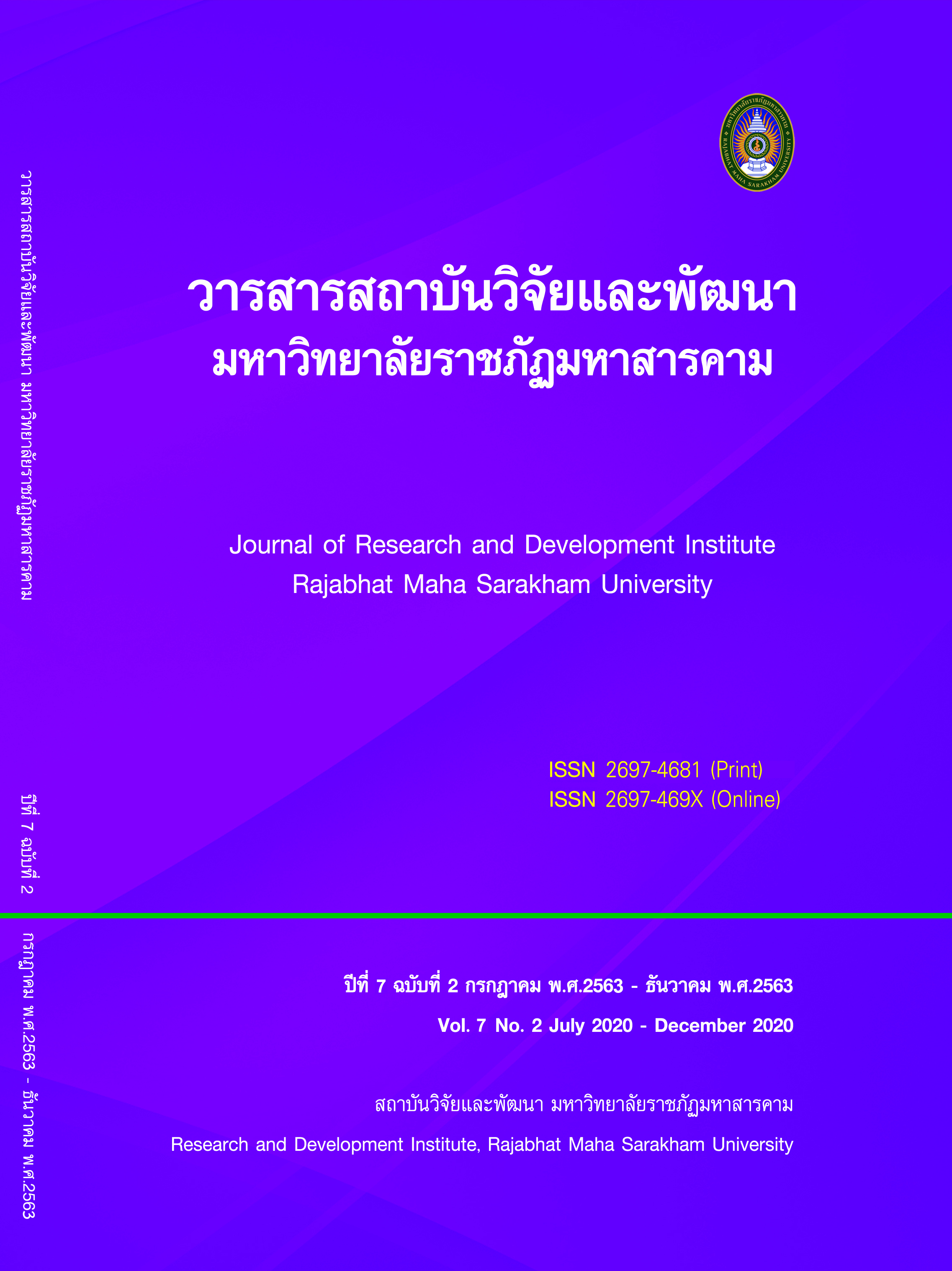ADMINISTRATORS’ INSTRUCTIONAL LEADERSHIP AFFECTING INSTRUCTIONAL BEHAVIOR OF ENGLISH LANGUAGE TEACHER (THE FIRST AND SECOND LEVEL STUDENTS) IN BASIC EDUCATION SCHOOLS UNDER NAKHONSAWAN PRIMARY EDUCATIONAL SERVICE AREA OFFICE 2)
Keywords:
instructional leadership, instructional behavior, English language teacherAbstract
The objectives of this research were 1) to study administrators’ instructional leadership affecting Instructional and behavior of English language teacher (The First and Second level students) in basic education schools under Nakhonsawan Primary Education Service Area Office 2, 2) to study the relationship between Administrators’ instructional leadership affecting instructional behavior of English language teacher (The first and second level students) in basic education schools under Nakhosawan Primary Education Service Area Office 2 and 3) to create an equation to forecast administrators’ instructional leadership to behavior of English language teacher (The First and Second level students) in basic education schools under Nakhonsawan Primary Education Service Area Office 2. The results of the study were as follows: Administrators’ instructional leadership and instructional behavior of English language teacher (The first and second level students) were at a high level. The relationship of administrators’ instructional leadership and instructional behavior of English language teacher (The first and second level students) had a positive correlation and at the moderate level with a statistically significant at .01 level. The variables necessary for forecasting instructional behavior of English language teacher (The first and second level students) were consisted of considering paired aspects was planning to strengthen teachers to be professional, tendency of curriculum changing and teaching evaluation of teachers respectively. The value of Cronbach’s Alpha was 41.10 percent (Adjusted R square =.411) at the .05 level of significance. The equation of forecasting could be formed as follows:
The forecasting equation by raw score:
Y ̂= 1.103 + 0.282(X4) + 0.187(X1) + 0.158(X3)
The forecasting equation by standard score:
Z ̂ = 0.287(X4) + 0.186(X1) + 0.170 (X3)
References
References
Amorn Boonyopagorn and Panadda Yimsakul. (2011). “Academic Leadership Behavior of the Primary School Principals Under Samut Prakan Primary Education Service Office Area 1 According to the Opinion of Teachers and Principals”. Chandrakasem Rajabhat University Journal, 17 (3), 147-157.
Chaiya Kromsaeng. (2010). The Relationship Between Academic Leadership of School Administrators and Educational Quality Assurance od Basic Schools Under the Office of Sakaeo Educational Sevive Area 2. Master of Education Thesis (Educational Administration): Rajabhat Rajanagarindra University.
English Language Institute. (2016). A new guide to teaching and learning English according to the EU Framework of Reference for Language Proficiency at Elementary Level. Bangkok: The War Veterans Organization's printing house.
Laongdao Papoting. (2013). “The relationship between instructional leadership of school administrators and effective teaching behaviors of teachers in secondary schools under the office of secondary education service area in Loei province”. Research and Development Journal Loei Rajabhat University. 8 (25), 1-13.
Ministry of Education. (2008). Basic Education Core Curriculum 2008. Bangkok: Printing House, Agricultural Cooperative Assembly of Thailand.
Nakhon Sawan Primary Educational Service Area District Office 2. (2017). Assessment of Academic Achievement in Grade 6. Nakhon Sawan : Nakhon Sawan Primary Educational Service Area District Office 2.
Phichayaphan Pakpian. (2017). “The Relationship between Academic Leadership of Administrators and Teaching Behaviours of Teacher in basic Education School under the Secondary Education Service Area Office 37”. Electronic Journal of Open and Distance Innovative Learning, 7 (1), 146-158.
Poirier, D.O. (2009). A principal’s and teachers’ perceptions and understandings of instructional leadership. A case study of one school. Degree of Master of Education in the Department of Educational Administration Graduate Studies University of Saskatchewan Saskatoon, Canada.
Sarintip Kimkhicaw. (2007). The Development of Instructional Program in Science on “the Water, Sky and Star” for Prathomsuksa 5 Students. Master of Education Thesis: Nakhon Sawan Rajabhat University.
Tiwakorn Suthibak. (2014). RELATIONSHIP BETWEEN ACADEMIN LEADERSHIP'S BEHAVIOR OF EDUCATIONAL INSTITUTION ADMINISTRATORS AND THE TEACHING'S BEHAVIOR OF TEACHERS IN EDUCATIONAL INSTITUTIONS UNDER THE OFFICE OF ROI ET PRIMARY EDUCATION SERVICE AREA 2. Master of Education Thesis (Educational Administration): Roi Et Rajabhat University.
Wiranut Pindavanija. (2004). "Bilingual School" Problems waiting to be solved (Article). Sarn Reform Magazine. 7(72), 17.
Yamane, Taro. (1973). Statistics: An Introductory Analysis. 3rd edition. New York: Harper and Row Publication.
Downloads
Published
How to Cite
Issue
Section
License
Articles that are published are copyrighted by the authors of the articles







